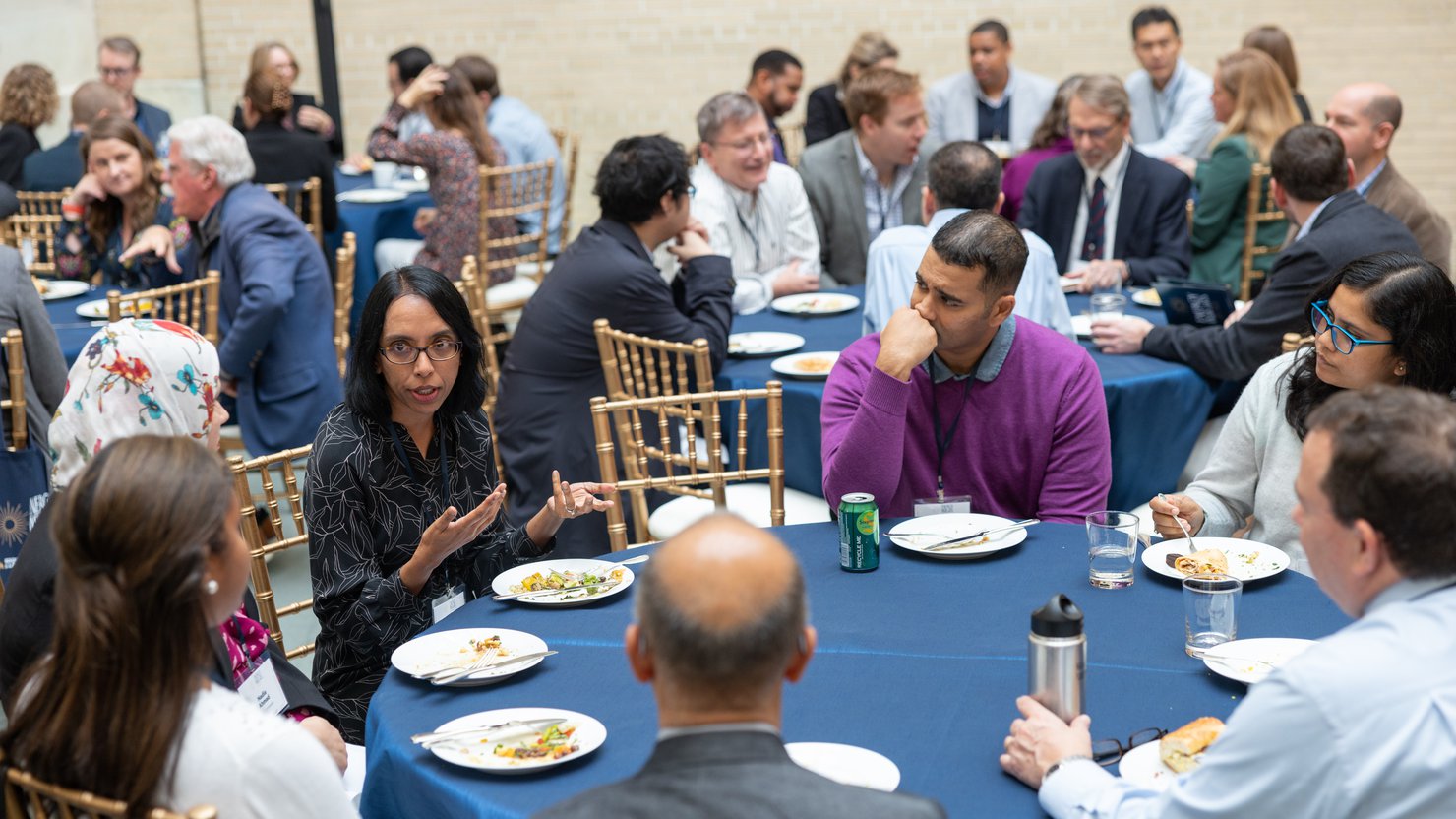A two-day interdisciplinary workshop this fall brought together people from universities, the Hill, federal agencies, state houses, industry, and nongovernmental organizations to collaborate on turning novel ideas into action for energy and the climate.
Research is designed to answer hard questions, and the research community thrives on that challenge. We would argue, however, that merely answering hard questions is not sufficient for the kind of impact that we and our research colleagues seek. Instead, to have an impact, research needs to exist not only on the proverbial bookshelf, but also in the hands of those who can put its wisdom to use. The magic really happens in the sharing of research across communities.
That is what the Energy Insights 2022 conference, jointly hosted this past December by Resources for the Future and the Alfred P. Sloan Foundation, was all about. We aimed to bring together a diverse set of scholars and practitioners from across the energy system. The conference was rooted in a commitment by both organizations to advancing interdisciplinary energy and environmental research that informs how decisions are made and how research translates into action.
“Energy Insights 2022 exceeded my expectations and much more,” said Pratik Dholabhai, Assistant Professor in the School of Physics and Astronomy at the Rochester Institute of Technology. “I have never had such an amazing experience and learning environment where policymakers, philanthropists, policymakers, scientists, engineers, and environmentalists come together to talk about our future.”

During the two-day gathering, we were joined by nearly 200 attendees who not only are dedicated to asking and answering important questions, but also are engaging with those who can benefit from these answers. People who believe that information flows should be multi-directional: not just researcher to decisionmaker, but vice versa, with input from community members, the private sector, and researchers in other disciplines. It takes a true research village to tackle some of the most pressing issues we face as a society related to energy transitions, decarbonization, and energy and environmental justice.
Who were these 200 attendees? They came from across the country, bringing expertise in economics, public policy, law, engineering, natural sciences, sociology, and more. Many are based at universities, while others joined us from Capitol Hill, federal agencies, state houses, industry, and nongovernmental organizations. Bringing together this blend of disciplines and sectors was a central mission of Energy Insights 2022.
“The conference far exceeded my expectations in terms of the number of different disciplines represented, the quality of the sessions, and the adherence to the conference themes throughout the activities,” reflected Ben Gilbert, Assistant Professor in the Department of Economics & Business at Colorado School of Mines.
Early on in the planning process, we—the conference organizing team—articulated the following four goals for the time together in Washington, DC:
- Everyone should learn something new.
- Everyone should meet someone new, preferably outside of their discipline.
- Everyone should come away knowing how to better align research with decisions that are being made right now—or at least decisions that will arise in the next few years.
- Everyone should leave feeling energized about the opportunities ahead and the power of the research community to work with the policy community and broader decisionmaking community to meet the moment.

The energy sector and policy landscape have evolved considerably since our last Energy Insights event in 2018, and the topics we chose to focus on in 2022 reflect those developments. Thematic sessions showcased multidisciplinary work on a range of topics. These issue areas included new technologies and drivers for industrial decarbonization, such as electrification of chemical manufacturing and steelmaking; decarbonizing medium- and heavy-duty vehicles; identifying new ways to improve grid resilience; understanding how extreme weather events and other disruptions might increase grid vulnerability; and exploring the technological, economic, and public engagement dimensions of negative-emissions technologies and pathways.
The conference opened with a plenary session on why research matters for decisionmaking, bringing in both federal and state-level perspectives. This session featured two researcher-policymaker pairs who discussed the role of analysis in informing the development of the Inflation Reduction Act, as well as lessons learned from the governance and design of regional transmission organizations for states and other localities. “The way these organizations have been put together matters: their institutional design makes a difference for how much clean energy is integrated into markets, the prices people pay, and technology innovation,” said Stephanie Lenhart of Boise State University and RTOGov, who alongside her RTOGov colleagues had the opportunity to connect with Colorado State Senator Chris Hansen and the Colorado Energy & Water Institute. This engagement gave the research team “an opportunity to share the research we’ve been doing, identify research gaps through our conversations and engagement with their organization, and think about our research design.”
Additional plenary sessions showcased a variety of topics relevant to energy system transitions. Five different philanthropic and government funders shared their complementary views on the needs and priorities for energy research. A multi-sector conversation involving economists, engineers, data scientists, and policymakers explored opportunities to improve energy data and economic models for decisionmaking. New research on equity in the energy transition highlighted place-based research that’s occurring in partnership with Tribal communities in the southwestern United States and rural and urban communities across the Midwest and southeastern parts of the country.

Perhaps the most innovative part of Energy Insights 2022 was the inclusion of four small-group roundtable discussions on key thematic areas that span the landscape of energy and environmental research. The topics included new approaches to diversify the energy and environment scholarly community, how to accelerate public-private partnerships for better research outcomes, developing strategies for generating and promoting interdisciplinary knowledge, and sharing best practices for community engagement in research. We were keen to ensure that attendees were in more than just “listening mode” for the two-day event, and instead had opportunities to bring their own experience and ideas to the discussion.
The goal of these sessions was to spark new ideas and collaborations that then can be turned into action. To help facilitate this outcome, the Sloan Foundation’s Energy and Environment Program offered to support four seed grants for proposed projects that focus on these cross-cutting themes, building on the conversations fostered and relationships formed at the Energy Insights conference. Conference attendees generated numerous submissions, seeking to bring to life ideas that arose at the conference. Their ideas covered topics like establishing new fellowship programs to diversify energy research; undertaking energy transition research in regions of the United States that scholarship often overlooks; and creating new opportunities for cross-sectoral engagement on critical topics such as the adoption of sustainable transportation strategies, life-cycle analysis of critical mineral mining, and the equity dimensions of power outages and electricity load loss.
The closing session of Energy Insights 2022 brought together four women leaders within the federal government, including Sally Benson from the White House Office of Science and Technology Policy, Julie Cerqueira from the US Department of Energy, Jennifer Gerbi from Advanced Research Projects Agency–Energy, and Jetta Wong from the US General Services Administration. These senior government representatives discussed how the United States is leveraging funding, networks, and tools to drive energy innovation. We were thrilled to hear directly from this all-star panel at this critical moment for US leadership on the development and deployment of clean energy technology.

We hope and believe that Energy Insights 2022 had something to offer every attendee, from the most seasoned researchers to students who are just entering energy and environmental research fields. The conference reminded us of the power of coming together to exchange knowledge and ideas—and we were humbled by the feedback that many attendees shared.
“I am an undergrad passionate about sustainable energy and wanted to hear from the best and brightest minds in the field. This conference surpassed my expectations,” noted Isabella Elmore, a student at George Washington University. “It was exceptionally humbling to encounter such open-minded and important leaders; to hear their profound discussion panels; and then talk to them at the mixers, where they answered my questions with open arms. Truly one of the most powerful and influential two days of my life so far.”





![shutterstock_367723004 [Converted] - WT listing.png](https://media.rff.org/images/shutterstock_367723004_Converted_-.2e16d0ba.fill-578x355.png)



